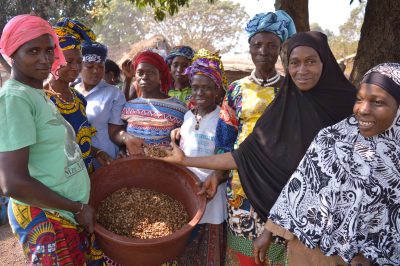At Cornell, there are a host of ways to get involved in international research and projects. CIPA’s own Hillary Mara (MPA ’17) was recently awarded a grant to conduct a project in Guinea through a grant from Cornell’s Institute for African Development. In this blog post, Hillary writes about her recent trip to Guinea where she and Jade Womack implemented a project with NARSEME, a Guinean NGO focused on enabling female entrepreneurship.
February 1, 2017
Working with women entrepreneurs in Bas-Simbaraya, Kindia, Guinea
Hillary Mara, MPA ‘17
Having arrived at CIPA to begin my studies in International Development after close to three years in the field, my perspective throughout all of my coursework has been, how do these theories, tool, or approaches apply to situations that I’ve observed firsthand? This perspective has pushed me to seize as many opportunities for experiential learning as possible, bringing me to India, Guinea (twice), Chile, and Uganda throughout my two years as a CIPA fellow. On my most recent trip to Guinea this winter break, I spent five weeks working with another graduate student, Jade Womack, to implement a project with the Guinean NGO NARSEME in Bas-Simbaraya, a small village in Guinea. This project was made possible thanks to a generous grant from Cornell’s Institute for African Development.
Out of necessity or nature, most women in Guinea are entrepreneurial. Overwhelmingly excluded from the formal economy, women partake in small-scale commerce, food processing, market gardening, and other income-generating activities in order to provide for their families. Nonetheless, many women are limited in their capacity to scale up these enterprises, due to lack of capital, technical knowledge, marketing prowess, and restrictive cultural mores.
Recognizing these factors, I collaborated with NARSEME staff and field agents to design a project to bring together thirty rural women to improve their financial independence. We sought to achieve this by reinforcing their entrepreneurial capacity, their technical skills in food processing, and by initiating conversations around the importance of managing natural resources in the community to enable sustainable, long-term exploitation. The project focuses on the local spice Soumbara, a natural seasoning with a powerful cultural, traditional, and nutritional importance across West Africa derived from the seed of the Néré tree (Parkia biglobosa).

Between English, French, Susu, Pulaar, Krio, and Malinké, using techniques such as images, symbols, and participatory methods, I worked with Jade to design and lead sessions on entrepreneurship and business topics including value chain analysis, marketing, and risk mitigation. NARSEME agents facilitated sessions with the cooperative and other town leaders on natural resource management, resulting in new community rules on the management of the Néré tree in protected forests. The project also included a participatory value-chain analysis: two women from the cooperative accompanied the Cornell team and NARSEME agents to three cities in Guinea to interview vendors and buyers of Soumbara to better understand prices, seasonal changes in purchasing, sourcing, quality, and preferences. We also constructed a small rural factory furnished with labor-saving devices including a solar drier, wood-saving improved cook stoves, and a diesel food mill. A Guinean technical expert led practical trainings with the women over a five-day period, demonstrating each step of the food transformation process.
Though the Cornell team has left, the project is not complete. NARSEME will continue to work with the women’s cooperative as they start their new venture: in the coming weeks NARSEME plans to lead trainings on tree nursery establishment, finances, packaging, and labeling, and will continue to develop linkages with wholesalers and other potential clients.

For me, one of the most satisfying aspects of this experience was seeing the personalities and strengths of these thirty women emerge as we worked alongside them. We knew to expect that Mamata would lead the others in song and dance during any short break in the training, Naby would present a uniquely insightful opinion on any question we posed, and Salematou would offer her wise advice to other group members. These women already possessed an entrepreneurial spirit and intense motivation to achieve their fullest potential, and I am hopeful that with the right tools, these women will be able to turn their vision into a concrete business. With a forum where their ideas are respected, considered, and validated, and new technical expertise, this new microenterprise will support the livelihoods of women and their families in this small community in Guinea.
Hillary Mara is a 2nd year CIPA fellow, focusing in International Development with an interest in agricultural development in West Africa. She is a returned Peace Corps volunteer who worked in Guinea and Mali, and currently works for IP-CALS for the System of Rice Intensification and on gender projects.

